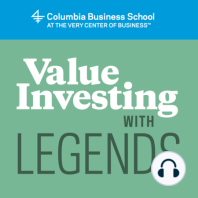61 min listen

Munib Islam - Creating Long-Term Value
Munib Islam - Creating Long-Term Value
ratings:
Length:
74 minutes
Released:
Dec 3, 2021
Format:
Podcast episode
Description
Time arbitrage is one of the biggest behavioral advantages an investor can have. Joining us today to talk about what it means to be an engaged, long-term shareholder is Munib Islam. Munib is someone who has experienced investing from many different angles, from a traditional long-short hedge fund to sitting on corporate boards and seeing the process of approving corporate performance from the inside. Munib Islam is the Founder and Managing Partner of LTS One Management, an investment partnership created earlier this year with funding from Jorge Paulo Lemann, Marcel Telles, and Carlos Alberto Sicupira. Before starting LTS One, Munib was a longtime partner and briefly Co-Chief Investment Officer of Third Point, a New York-based hedge fund with over $15 billion of assets under management. Before joining Third Point, Munib worked as an associate at Oak Hill Capital and Lazard. He received a BA in Economics magna cum laude from Dartmouth College and an MBA from the Graduate School of Business at Stanford University. In this episode, Munib, Tano, and Micheal discuss Munib’s introduction to a career investing, similarities and differences between working in private equity and public markets, why Munib was excited to bring capital to European markets, the value of cognitive diversity, Munib’s investment philosophy, the challenges of activism, and so much more! Key Topics: How Munib was initially drawn into the world of investing (3:06) Munib’s early career in the investing world (4:32) Where Munib developed his investing foundation (6:27) Learning about the experiential aspects of an investing career (7:27) The overlap at the analyst level for private equity and public markets (8:58) Key differences between working in private equity and public markets (10:27) Munib’s journey from analyst to co-portfolio manager at Third Point (12:48) Why Munib was well-positioned to find opportunities in the European markets (14:39) Challenges of attracting investment in Europe in the wake of the financial crisis (15:47) The main goals behind the founding of LTS One (18:31) Firms with risk-management DNA versus stock-picking DNA (21:00) Developing a robust risk management approach (22:24) Munib’s evolving approach to hiring (23:58) Focusing on capital allocation improvement with a soft twist of operational improvement (26:42) What investors can learn from academia (28:07) Munib’s investing philosophy (31:33) Finding ideas where you can change a company’s trajectory (33:30) The actionability aspect of activism (36:05) The value of time arbitrage (39:19) Crucial elements for successful long-term orientation (43:36) The benefit of highly concentrated activist strategy (46:22) Why Munib looks for good businesses with questionable leadership (48:26) What operational excellence looks like (50:27) Common pitfalls in capital allocation (51:37) Munib’s approach to portfolio optimization (53:43) How Third Point identified Baxter as a good investment opportunity (55:56) Third Point’s strategy for Baxter (58:11) Munib’s biggest lessons from his first board experience at Baxter (1:00:58) Highlights from Third Point’s investments in Sony (1:02:50) LTS One’s investment in Cellnex Telecom (1:05:50) Why it’s an exciting time to invest in International Flavors & Fragrances (1:10:43) Munib’s worries about the current market environment (1:11:09) Munib’s current focus (1:12:36) Why Munib believes in reading widely across disciplines (1:13:25) And much more! Mentioned in this Episode: Robert Hagstrom’s Book | Investing: The Last Liberal Art The Nomad Investment Partnership Letters To Partners Daniel Coyle’s Book | The Culture Code: The Secrets of Highly Successful Groups Thanks for Listening! Be sure to subscribe on Apple, Google, Spotify, or wherever you get your podcasts. And feel free to drop us a line at valueinvesting@gsb.columbia.edu. Follow the Heilbrunn Center on social media on Instagram, LinkedIn, and more!
Released:
Dec 3, 2021
Format:
Podcast episode
Titles in the series (57)
Jean-Marie Eveillard - Taking a Top-Down Approach to Value Investing: Today’s conversation is with international value investor, Jean-Marie Eveillard. As portfolio manager of the Société Générale International Fund, later becoming the First Eagle Global Fund, where he returned an annualized 15% for over 25 years.... by Value Investing with Legends